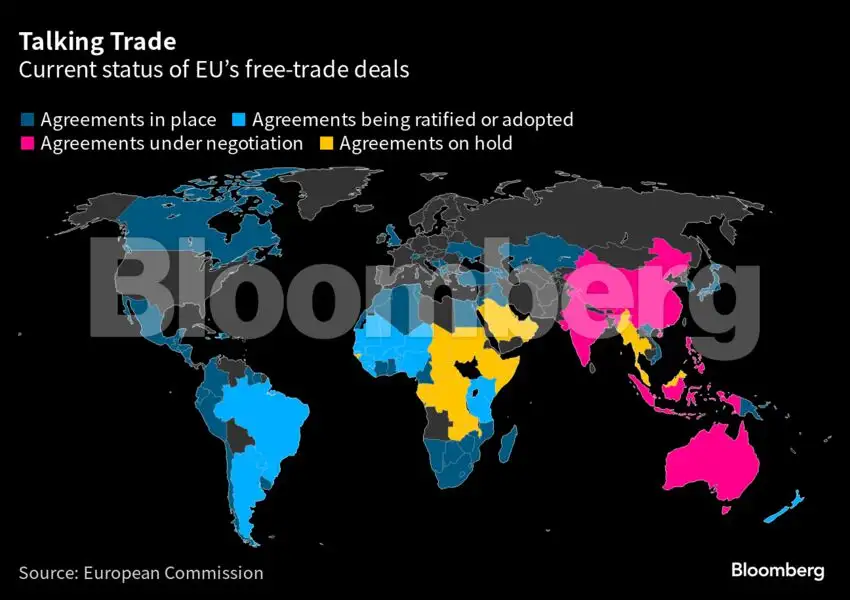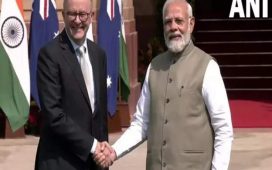European Commission Vice President Valdis Dombrovskis will discuss the proposed pact with Indian commerce minister Piyush Goyal on the sidelines of a Group of 20 trade meeting in India, as both sides seek to diversify their economies away from China.
The EU has a strong interest in sealing the trade deal but the bloc’s sustainability regime is complicating its trade negotiations across a number of countries, people familiar with the matter said. The bloc needs to figure out how to communicate more clearly that green elements in the trade talks are legally required to avoid being labeled as protectionist, the people added.
The EU sees part of its mission as using its economic weight to promote green goals globally, but other countries are often reluctant to make those kind of commitments, which has snagged negotiations on a range of trade deals from South America to Asia.
A free-trade agreement with India — one of the world’s fastest growing economies — would unlock mutual access for goods and investment in key areas such as digital markets, critical raw materials and energy.“The EU standards are quite high and its approach to FTAs is very technocratic. India is a test case to see whether the EU is able to push its strategic interest,” said Garima Mohan, senior fellow at the German Marshall Fund think tank, adding that India is set to hold a general election next year. “If they are able to close a deal before the elections, India would be a success story for the EU.”
 Bloomberg
BloombergMiriam Garcia Ferrer, a spokeswoman for the European Commission, said the bloc looks forward to the next formal round of talks with India in Brussels starting Oct. 16.
“Advancing this FTA will bring us closer to removing barriers between the EU and one of the largest and fastest-growing economies in the world, allowing both sides to unlock the full potential of our trade and investment relationship,” she said.
Brazilian President Lula da Silva recently decried what he said were protectionist measures disguised as environmental concerns, a dynamic that stymied the bloc’s push for a trade accord with the Mercosur countries — Argentina, Brazil, Uruguay and Paraguay.
The Mercosur negotiations were launched more than 20 years ago, at a time when trade was not yet a tool to achieve objectives in the realm of climate and sustainability. Now, Latin America countries don’t meet the EU sustainability requirements and the bloc put forward instruments to limit deforestation and carbon intensive production processes that companies struggle to fully understand.
“This novelty brings confusion and leads to a lack of trust and skepticism from trade partners,” said Oscar Guinea, researcher at the European Centre for International Political Economy. “Governments are not happy as they are seeing a new bias for trade.”
Similarly, deforestation is the main stumbling block to conclude trade talks with Indonesia, an important trade partner and key to the EU’s geopolitical ambitions in the Southeast Asia region. Conversations are slowly progressing but the country expects more leniency toward palm oil producers as the current rules would hurt local producers. Malaysia also expressed concerns over its smallholders, that together with Indonesia, account for 83% of the worldwide palm oil production.
A trade deal with Australia encountered similar challenge as the EU had pledged not to move forward with negotiations unless the country would commit to more ambitious climate goals. Negotiations started in 2018 and are still ongoing after the two failed to reach an agreement at their latest meeting in July. Sustainability is also set to be at the core of the future deal between the EU and Thailand, as the bloc is undertaking a sustainability impact assessment before resuming negotiations in mid-September.
“The EU does not want to stop trade, but rather ensure companies follow process that are less carbon intensive,” Guinea said. “The EU should be careful when imposing conditions to ensure that it does not to lead to trade diversion. If this happens the EU would not achieve any of its goals, and only end up with higher imports prices.”








